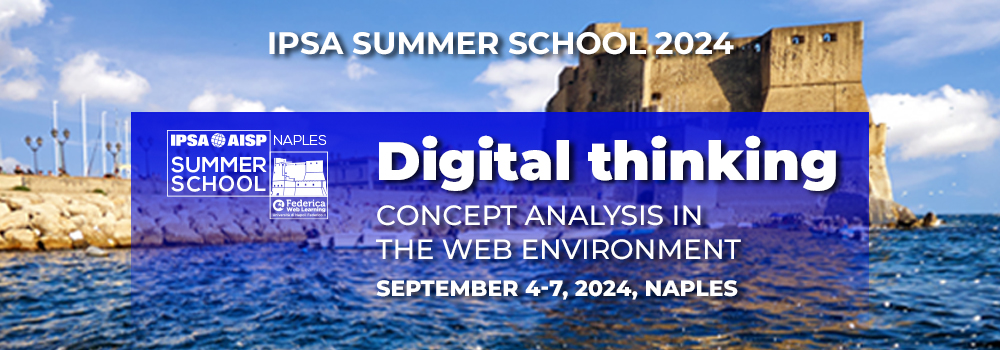Please note that the IPSA–Federica Summer School Digital Thinking: Concept Analysis in the Web Environment, which is usually held in September, will be scheduled for a later date. The organizers are currently assessing possible dates and formats. Further updates will be provided as soon as they are available.
IPSA-Federica Summer School
Digital Thinking: Concept Analysis in the Web Environment
4-6 September 2024
Naples, Italy
The 5th edition of the IPSA-Federica Summer School - Digital Thinking: Concept Analysis in the Web Environment was held in a hybrid format in Naples, Italy, from 4-6 September 2024. This marked the inaugural edition hosted in the city of Naples, following the event’s successful past implementation on the island of Capri.
Jointly organized by Federica Web Learning and IPSA, the Summer School adopted an innovative workshop format that combined online and in-person learning to provide advanced theoretical and practical training in methodology. Participants engaged with the Hyperpolitics approach, a pioneering application of web 2.0 logic to create a Repository of Political Science Concepts; an academic ecosystem, comprising books (Calise and Lowi, University of Chicago Press, 2010), a working platform (hyperpolitics.net), hyperlinks and learning communities that define concepts in terms of their relationship to other concepts.
Module 1
Before the Summer School began, participants completed Module 1, an online course se on edX Understanding Political Concepts or Coursera Understanding Political Concepts, by Mauro Calise and Werner Patzelt as fundamental preparation in the theoretical framework of the Hyperpolitics methodology for concept formation.
Module 2
Module 2 focused on the individual development of a Concept Matrix using the Hyperpolitics method. Participants engaged in seminars and tutorials, emphasizing digital libraries and online research. Interactive laboratory sessions provided hands-on guidance as participants drafted their papers and used Internet resources to enrich their work. The week-long residential course also fostered informal discussions with instructors, visiting scholars, and peers - extending into social moments over lunch, dinner, and evening walks through Naples. The Summer School concluded with participants presenting their Concept Matrices in the final session.
Local Organization Committee: Fortunato Musella, Valentina Reda.
2025 Edition
Please visit the Summer School for further information or contact ipsamooc@federica.eu.
Cancelled for 2023. Please stay tuned for updates on the 2024 edition.

The 2022 edition of the IPSA-Federica Summer School - Concept Analysis in the Web Environment was jointly organized by IPSA and the University of Naples Federico II. After two years of online-only teaching, the Summer School returned to the wonderful Villa Orlandi on the Island of Capri, on 19-21 September 2022.
This leading IPSA program focused on one of the fundamental challenges for political science: developing political science concepts. The theoretical framework and analytical tools that participants used are based on the academic ecosystem called Hyperpolitics, which comprises books (Calise and Lowi, University of Chicago Press, 2010), working platform, hyperlinks and learning communities.
The Participants developed their own matrices for Political Science concepts through an innovative mix of online learning and seminar activities. This formula was built on the consolidated and successful experience of Ph.D. programs in political science and previous IPSA Summer Schools.
The summer school comprised two modules.
Module 1: Online Course
Participants followed the IPSAMOOC course Understanding Political Concepts, by Mauro Calise and Werner Patzelt, published on edx, the Harvard and Mit platform. Attendance and successful completion of the MOOC module was a prerequisites for admission to the residential module, where participants were guided to developing their own conceptual framework based on the matrix methodology.
Module 2: On-campus Workshop
In the interactive sessions, course instructors were on hand to facilitate and guide students as they drafted their own papers and navigated the authoritative online Political Science resources they needed. Group discussion and feedback on all working papers paved the way for a final paper and a presentation of each concept definition at the end of the Summer School.
A special feature of the Capri Summerschool was the unique «socratic» atmosphere of challenging all-day long (lunch and dinner included!) brainstorming.
On completion of both modules of the Summer School, participants were awarded an IPSA Summer School Certificate of participation.
Please contact ipsamooc@federica.eu if you have any questions about your applications.
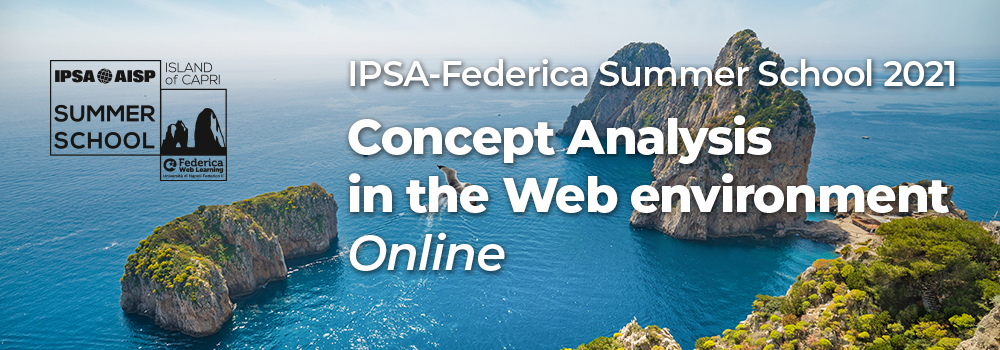
The 2021 edition of the Capri IPSA Summer School, Concept Analysis in the Web Environment was jointly organized by IPSA and Federico II University. The event was held online this year before returning to the wonderful island of Capri in 2022.
The format of the Summer School was an intensive and interactive workshop, therefore, places were limited, and admission was granted on a first-come-first-served basis.
This leading IPSA program focused on one of the fundamental challenges for political science: developing political science concepts. The theoretical framework and analytical tools that participants used are based on the academic ecosystem called Hyperpolitics, which comprises books (Calise and Lowi, University of Chicago Press, 2010), working platform (www.hyperpolitics.net), hyperlinks and learning communities.
The Participants developed their own matrices for political science concepts through an innovative mix of online learning and seminar activities. This formula was built on the consolidated and successful experience of Ph.D. programs in political science and previous IPSA International Summer Schools.
Dates
Session 1: 5-6 November 2021
Session 2: 3-4 December 2021
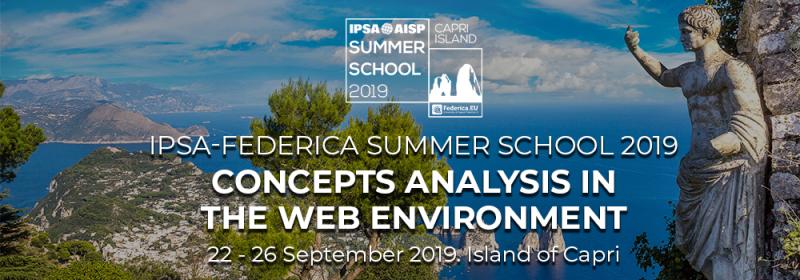
IPSA-Federica Summer School in Concept Analysis in the Web environment
September 22-26, 2019
Capri, Italy
The 2nd edition of the IPSA Summer School on Concept Analysis in the Web environment was held in Anacapri, the enchanting island in the gulf of Naples, Italy.
This leading IPSA program provided advanced theoretical and practical training in qualitative methodology, based on the Hyperpolitics approach for concept analysis in political science. Hyperpolitics was a pioneering application of web 2.0 logic to create a Repository of political science Concepts. An academic ecosystem, comprising books (Calise and Lowi, University of Chicago Press, 2010), working platform (www.hyperpolitics.net), hyperlinks and learning communities that defines concepts in terms of their relationship to other concepts.
The format and venue of this event were a perfect fit: the layout and flow of the picturesque Orlandi Villa and gardens reflected the varied and fluid structure of the program activities. The combination of comfortable study rooms, online workspaces, shady terraces and lawns, offered the perfect backdrop for the blend of formal and informal, individual and group reflection, discussion, tutoring and presentations that the Summer School offers.
The format of the Summer School was an intensive and interactive workshop.
Key dates:
5 May 2019 - Applications close at midnight
2 June 2019 - Closing date for early bird payment of registration fee
23 June 2019 - Closing date for payment of registration fee
For further information please visit the website at http://ipsasummerschool.federica.eu/ or write to ipsamooc@federica.eu.
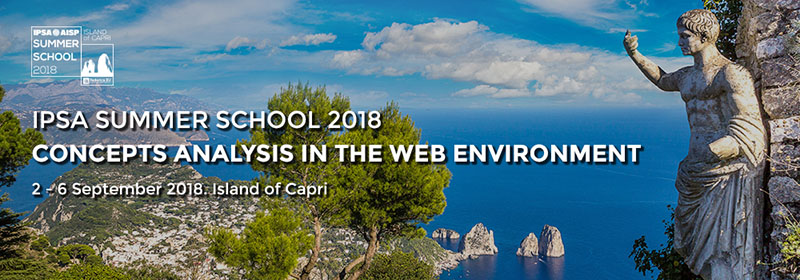
IPSA-Federica Summer School in Concept Analysis in the Web environment
September 2-6, 2018
Island of Capri, Italy
The 1st edition of the IPSA Summer School on Concept Analysis in the Web environment was held on the island of Capri, in the gulf of Naples, Italy, September 2-6 2018.
Jointly organised by Federica Web Learning and IPSA, the summer school followed an innovative workshop formula, combining a mix of online and face-to-face learning, to provide advanced theoretical and practical training in methodology. The specific approach explored by the 14 participants was that of Hyperpolitics. Hyperpolitics is a pioneering application of web 2.0 logic to create a Repository of Political Science Concepts; an academic ecosystem, comprising books (Calise and Lowi, University of Chicago Press, 2010), working platform (www.hyperpolitics.net), hyperlinks and learning communities that defines concepts in terms of their relationship to other concepts.
The 2018 Summer School comprised two modules:
Module One: Online Course
Module one was completed before the Summer School started with participants following the online course Understanding Political Concepts, by Mauro Calise and Werner Patzelt as fundamental preparation in the theoretical framework of the Hyperpolitics methodology for concept formation. The course was structured to allow for anytime, anyplace learning and to provide training in self-regulated and online learning. A battery of integrated tests and assignments enabled participants to monitor their own progress and assess their learning.
Attendance and successful completion of the MOOC module was a prerequisite to admission on the residential module, Participants thus came to the Summer School with a Political Concept of their choice that the face-to-face time with tutors and peers on Capri would enable them to develop in depth. Regular Skype meetings/tutoring sessions were held during module one between participants and instructors to discuss the theory, iron out any difficulties and guide participants in their choice.
Module two: Residential workshop
The scope of Module two was the individual development of a concept matrix applying the Hyperpolitics method. Tuition took the form of seminars and tutorials with an emphasis on knowledge and experience of online digital libraries. Interactive laboratory sessions saw course instructors on hand to facilitate and guide participants as they drafted their own paper and mined relevant internet sources to enhance their work. Throughout the week-long residential course, participants moved between formal and informal discussion and feedback sessions with instructors, visiting scholars and peers, which extended into the informal spaces of lunch and dinner and evening walks round Capri. Culminating in a presentation of their Concept Matrix in the final session.
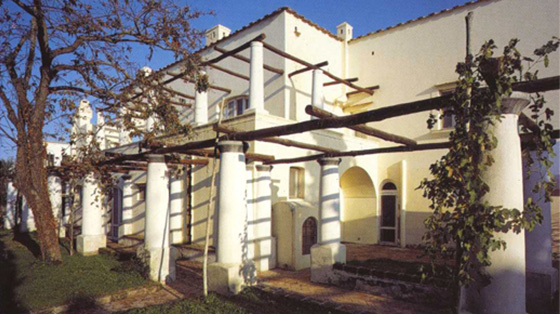
Institutional partners:
Federica Web Learning and IPSA wish to thank the University of Naples Federico II for their generous provision of the Villa Orlandi venue for the Summer School
Local Organisation Committee:
Fortunato Musella
Valentina Reda
For further information, please visit the website or write to ipsamooc@federica.eu.

